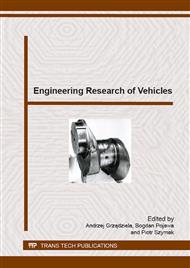p.188
p.196
p.204
p.212
p.220
p.228
p.239
p.247
p.258
Analysis of Economic Costs and Environmental Benefits of LNG as the Marine Vessel Fuel
Abstract:
Recent years of the growing concerns over ship emissions have driven policy changes at the international level toward more stringent marine vessels emission standards, mainly SOx and NOx. This has also been a key factor for innovation in marine technologies leading to decrease these emissions. LNG as fuel is one of the solutions as this results in the elimination of SOx emissions, and significant reduction of NOx, CO2 and particulate matter (PM) emissions, when comparing to the emissions from a typical vessel powered by marine diesel oil. This paper analyses environmental benefits of LNG-fuelled marine engines in the light of investment and operating costs, as well as the perspectives of the infrastructure development.
Info:
Periodical:
Pages:
239-246
DOI:
Citation:
Online since:
July 2015
Authors:
Keywords:
Price:
Сopyright:
© 2015 Trans Tech Publications Ltd. All Rights Reserved
Share:
Citation:


